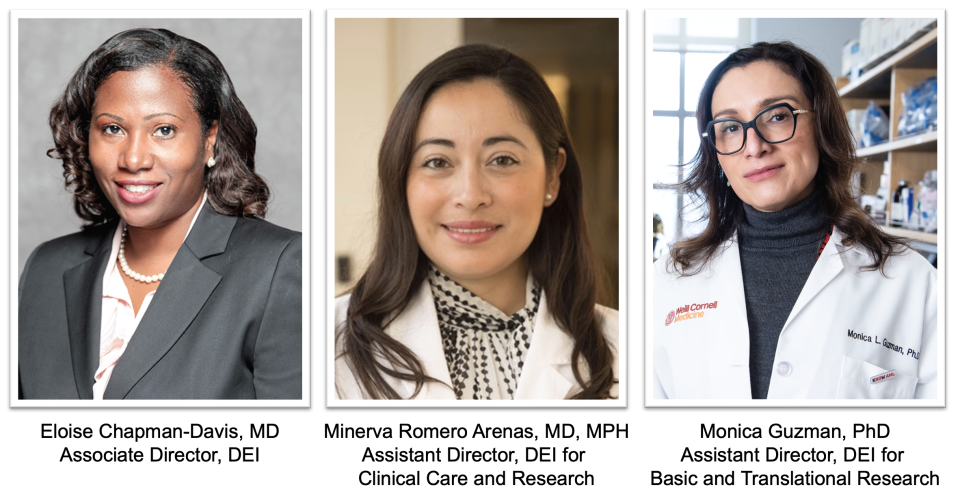Meyer Cancer Center Appoints Inaugural DEI Leadership Team

The Sandra and Edward Meyer Cancer Center (MCC) of Weill Cornell Medicine and NewYork- Presbyterian Hospital has appointed a trio of outstanding physicians and researchers to oversee the Center’s first Office of Diversity Equity and Inclusion (DEI): Eloise Chapman-Davis, MD, Minerva Romero Arenas MD, MPH, and Monica Guzman, PhD.
The DEI team leads MCC efforts to ensure representation of all people in our cancer workforce, reduce disparities in cancer burden and care in the MCC community, and improve the inclusion of diverse populations in MCC research and clinical trials.
“The Meyer Cancer Center was founded with a mission to bring health equity to the underserved communities in Brooklyn and Queens,” said MCC Director Jedd Wolchok, MD, PhD. “With the addition of Drs. Chapman-Davis, Romero Arenas and Guzman to our leadership team, we are taking a critical step toward fulfilling that important mission – ensuring that our research and our workforce are inclusive of people from all of the diverse backgrounds representing the communities we are entrusted to serve.”
Dr. Chapman-Davis (she/her) will serve as the inaugural MCC Associate Director of DEI. Her charge is to build a diverse, inclusive workforce within MCC that provides equal access to care, education, and opportunity. She is an Associate Professor of Obstetrics and Gynecology, and Division Director of Gynecologic Oncology at Weill Cornell Medicine. Her clinical and translational research focuses on identifying interventions to improve gynecologic cancer outcomes through early detection, prevention strategies, and clinical trials that reach underserved populations both locally and around the world. She has dedicated her career to advancing health equity, eliminating cancer healthcare disparities and fostering diversity and inclusion in medicine and science through mentorship activities, workforce diversification initiatives and community outreach. Over the last six years, Dr. Chapman-Davis has served as the Chair of Diversity, Inclusion, and Health Equity for the Society of Gynecologic Oncology and has created educational programing focusing on cancer disparities for AACR, ACOG and ASCO.
Dr. Romero Arenas (she/her) is Assistant Director of DEI for Clinical Care and Research. Her charge is to improve representation in the clinical workforce as well as access to care, outcomes, and inclusion in clinical research for diverse populations. Dr. Romero Arenas is an Endocrine & General Surgeon at NewYork-Presbyterian Brooklyn Methodist Hospital and Assistant Professor of Surgery at Weill Cornell Medicine. Her interests include benign and oncologic endocrine neoplasms, hereditary syndromes, health disparities, quality improvement, global health, and genomics. A native of Mexico City, Mexico, Dr. Romero Arenas is passionate about diverse recruitment of the next generation of surgeons and is involved in mentoring through the Association of Women Surgeons, Tour for Diversity in Medicine, Latino Medical Student Association, National Hispanic Medical Association, and Building the Next Generation of Academic Physicians. Founding Member of the Latino Surgical Society and was appointed as its First President.
Dr. Guzman (she/her) is Assistant Director of DEI for Basic and Translational Research. Her charge is to foster career advancement for basic scientists from backgrounds that are traditionally underrepresented in research. She is Associate Professor of Pharmacology in Medicine and leads a translational research program in the Hematology and Medical Oncology Division at Weill Cornell Medicine. She is a co-chair of the Social Justice and Anti-Racism Task Force, the co-coordinator of the Sociocultural Barriers to STEM course, and part of the MCC Community Advisory Board at Weill Cornell Medicine. She is involved in health disparities research for patients with acute myeloid leukemia through international collaborations with Mexico, Nigeria, and The Ohio State University, and is the co-chair of the Committee of Inclusion and Representation for the Federation of Clinical Immunology Societies.
Founded in 2014, MCC engages diverse populations in groundbreaking basic, clinical, and population-based research to reveal genetic, environmental, and social determinants of cancer burden and disparities in the community. MCC aims to address disparities in cancer incidence, mortality and quality of life in New York City, which is home to a population unmatched in ethnic diversity with a majority of people identifying as non-white and/or Hispanic. Within this community, stark disparities in cancer mortality based on self-reported race and ethnicity energize MCC’s commitment to the principles of diversity, equity and inclusion that will accelerate cancer research for these traditionally underserved populations.



